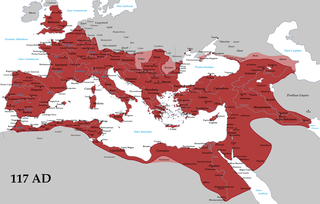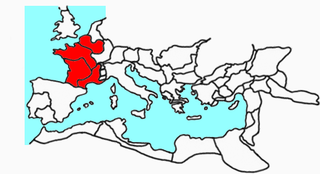Gaius Julius Silanus was a Roman senator and general who held a series of offices in the emperor's service. He was suffect consul for the nundinium of January-April 92 as the colleague of Quintus Junius Arulenus Rusticus. [1] Silanus is known solely through inscriptions.

The Roman Empire was the post-Roman Republic period of the ancient Roman civilization. Ruled by emperors, it had large territorial holdings around the Mediterranean Sea in Europe, North Africa, and West Asia. From the constitutional reforms of Augustus to the military anarchy of the third century, the Empire was a principate ruled from the city of Rome. The Roman Empire was then divided between a Western Roman Empire, based in Milan and later Ravenna, and an Eastern Roman Empire, based in Nicomedia and later Constantinople, and it was ruled by multiple emperors.

A consul held the highest elected political office of the Roman Republic, and ancient Romans considered the consulship the highest level of the cursus honorum.
Nundinium, a Latin word derived from the word nundinum signifying the cycle of days observed by the Romans, which came to be used under the Empire to indicate a period of consulship. When, under the Empire, several pairs of consuls were created in one year, the period of a single consulship was called a nundinium.
Ronald Syme speculates Silanus came from Tres Galliae, and adds that "the cognomen need have nothing to do with the aristocratic Junii Silani." [2] He was co-opted into the Arval Brethren 22 January 86 to replace the recently deceased Gaius Vipstanus Apronianus. [3] While he was appointed magister in the year 87, he was absent from the records of the sodales for the rest of that year, and again in 89-91; Syme speculates Silanus was absent due to imperial appointment either to command a legion or to govern one of the eight imperial praetorian provinces. [4]

Sir Ronald Syme, was a New Zealand-born historian and classicist. Long associated with Oxford University, he is widely regarded as the 20th century's greatest historian of ancient Rome. His great work was The Roman Revolution (1939), a masterly and controversial analysis of Roman political life in the period following the assassination of Julius Caesar.

Roman Gaul refers to Gaul under provincial rule in the Roman Empire from the 1st century BC to the 5th century AD.
A cognomen was the third name of a citizen of ancient Rome, under Roman naming conventions. Initially, it was a nickname, but lost that purpose when it became hereditary. Hereditary cognomina were used to augment the second name in order to identify a particular branch within a family or family within a clan. The term has also taken on other contemporary meanings.